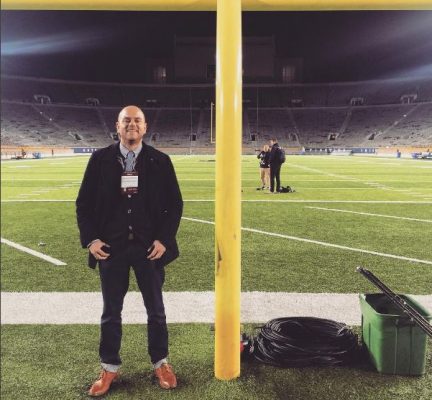
Credit: Matt Fortuna / Instagram
Matt Fortuna spent six years covering the Notre Dame football team up close for ESPN. His tenure at the World Wide Leader ended Dec. 31, but the future remains bright for this 2011 Penn State graduate.
We caught up this week with Fortuna to discuss his story so far – and his road ahead in sportswriting. This is the first of a lengthy two-part interview. The second installment will appear tomorrow.
First, tell us a bit about yourself. Where did you grow up? Where is home nowadays? What do you do when you’re not researching/interviewing/
First things first: I was born and raised on the mean streets of Manhattan’s Upper East Side. As you can imagine, despite being in the shadow of future Big Ten power Rutgers, college football wasn’t exactly the most popular sport in the area.
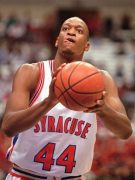
Credit: Associated Press
I was spoiled as hell as a Yankees fan, and much later on with the Giants. But the sport I fell in love with — and still am, really — was basketball, both college and pro. My dad had some close friends from Syracuse, and I got hooked on the college game during John Wallace and the gang’s memorable run to the title game in 1996. That would eventually lead to far too many missed school days to check out matinee Big East tournament games at the Garden, which doubled as the site of my first real — and scarring — in-person sports memory as a kindergartener: Patrick Ewing’s missed finger roll in Game 7 of the 1995 Eastern semifinals against the Pacers, which later became the impetus for a “30 for 30” on the rivalry. Go figure.
To make matters worse, we were sitting behind that basket. I ended up practically living at the Garden while growing up, and my heart was inevitably broken year after year despite promising Knicks runs. Throw in the fact that my mother was from Chicago and Michael Jordan owned the Knicks (and everyone else) back then, and I guess I had a pretty tortured childhood.
How’s this circle back to now? Well, long story short, my mother’s mother was an Irish Catholic in Chicago who more or less demanded I watch and go to Notre Dame. (Despite, of course, having no family connections to the school.) The first part was easy, as I began to love college football by the time I got to Xavier High School and was surrounded by even more Irish Catholics. (I’m half-Irish, but my dad was born in Italy.)
As for the second part, when my grandmother sent me a blank check to apply to Notre Dame, I sent her back my report card and told her to save her money. (We’ll just blame the academic shortcomings on the aforementioned Big East games.) When I got the job at ESPN covering the Irish, it was, in some ways, even better in my grandmother’s eyes than attending the place. (Although, naturally, she didn’t have a computer and only read Brian Hamilton in the Tribune.)
I’m in Chicago now, but my dad and both my brothers are still in New York and I try to get back as much as possible. Sports in some way, shape or form consumes most of my professional and social life, but I absolutely love traveling, am always reading something and, fairly recently, began coaching youth basketball on the side, which is a blast. I’m also a dog lover. Oh, and my family is in the restaurant business, and while you’ll never see me Yelping, I do try to hit as many different spots in as many different cities as possible. (Until the fateful day when I finally learn how to actually cook a decent Italian meal. Maybe Bob Diaco can lend me a hand.)
I think a lot of our readers will know you from your coverage of Notre Dame. But you were also responsible for covering ACC football for ESPN. How was your week broken down? Did ESPN prefer you spent time covering one over the other?
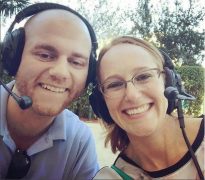
Credit: Matt Fortuna / Instagram
Every week was unique, depending on what happened the previous weekend and which matchups were coming up. I was lucky to have the absolute best group of colleagues on the ACC beat in Andrea Adelson, David Hale and Jared Shanker, whom I actually lived above during my senior year of college. The four of us are very, very close. There was no real directive in terms of covering one thing over the other, but reporting on programs both big and small proved beneficial, as you’re able to cover the best of the best while also building deeper relationships with important figures at programs that don’t get as much media attention. Was it hectic at times? Sure, but I loved it. And the more programs you cover, the better perspective you get of what works and what doesn’t in terms of coaching philosophies, media access and other matters.
There was no real directive in terms of covering one thing over the other, but reporting on programs both big and small proved beneficial, as you’re able to cover the best of the best while also building deeper relationships with important figures at programs that don’t get as much media attention. Was it hectic at times? Sure, but I loved it. And the more programs you cover, the better perspective you get of what works and what doesn’t in terms of coaching philosophies, media access and other matters.
We were all caught off guard by your ESPN departure, mostly because I think the consensus among our group was that you were working the beat very well. What was your reaction?
Appreciate that, gang. Perhaps I’ve had pieces of humanity sucked out of me over the years from listening to the same football coaches preach the same cliche over and over again: “You can only control what you can control.” But for me, that simply meant busting my behind every day at a job I loved despite knowing nothing was ever really guaranteed in this business — which, as you all know, is changing by the day.
My reaction to the news? Twenty-seven years ago I was on life support after emergency open-heart surgery and given little chance to live. That — and the seemingly eternal aftermath — was tough. Right now I’m just excited about the new challenges ahead after a great run at ESPN, who took a chance on a recent college graduate six years ago and gave him a huge platform, a vast audience and amazing colleagues to work with. For me both personally and professionally, it is time for a change.
One of your strengths is that you’re diversified. People can read your stuff on a couple of different sites. For the short term, where can people find your work?
I appeared on CLTV’s SportsFeed this week talking about the title game, the Big Ten’s bowl struggles and Notre Dame’s wild 2016. I also wrote a title-game preview piece for The New York Times, a place that I have freelanced for in the past. I should have some college basketball stories coming shortly for a number of outlets as well.
What’s the long term plan? Have you given any consideration to covering a different team? A different sport? You spent some time covering Yankees and Pirates baseball and we know you can rock a Cubs hat and a beer with the best of them.
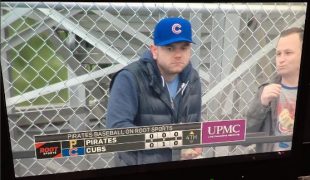
Credit: Matt Fortuna / Instagram
Funny story behind that Cubs photo: Before the game I was texting with Pete Toma, an excellent producer for the Pirates whom I got to know during my time in Pittsburgh. He asked where I was sitting and, thinking he wanted to come say hello, I told him I was at a rooftop and would probably have to wait until after the game to meet up.
A few minutes later, he texted me that photo, saying: “This rooftop?” As for my plan, I’m hesitant to make any long-term statements given the nature of this business. College sports is my bread-and-butter and I absolutely love it, but I certainly am open to a change if the opportunity presents itself. I will say that covering the NBA has always been appealing to me.
Not a lot of beat writers have to stand in front of a camera and talk to anchors on “Outside the Lines” or “Sportscenter.” Did you relish those opportunities? Are you at all interested in pursuing a television career instead of online print or newspaper?
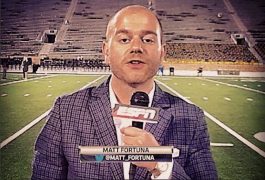
Credit: Matt Fortuna / Instagram
As a writer at heart, I’m in favor of anything positive that can direct more eyeballs to my written work. There are few better places to do that than on-camera for ESPN. TV hits were rewarding, despite the fact they usually happened in light of a player arrest or some other misgiving. You always hear from people you hadn’t spoken to in years after you go on. More importantly, you gain legitimacy in the eyes of the people you cover. I’m not saying that’s how it should be, but that’s how it is, even if I was no smarter after an appearance than I was before. Players, coaches and administrators just seemed more forthcoming.
As for pursuing a TV career, we’ll see. I’d imagine I’d need much more on-air experience to have a full-time TV gig, though most of the TV pros started as writers anyway. It’s important to be able to do both to some degree in this climate. That said, I absolutely love writing, even if I know a potential article of mine is going to get buried by other content on a page and won’t be well-read. I don’t care. I was the nerd in school who looked forward to writing assigned essays and, at least at this stage of my career, I can never see myself giving that up in full.
There’s no lack of Notre Dame football coverage nowadays. Some of the writers have spent years cultivating sources within the program. How difficult was it to get a toehold? What was your “I made it” moment?
My “I made it” moment was obviously getting ethered by Freddie Prinze Jr. on Twitter before the 2016 spring game. You don’t know how many times I saw some of his movies growing up. (Or how many times he still tweets me over random football stuff. Seriously.)
To your first question, though: It takes a lot of time and effort, for sure. My first day on the beat came the week of the USF opener in 2011, and I’d be lying to you if I said that season didn’t feel like drinking water from a fire hydrant to some degree. Once I got a full year under my belt, though, the team also happened to be really good, and that memorable 2012 run put everyone in a bright mood and made things easier from a relationship standpoint.
And that’s really what this is all about at the end of the day: Relationships. Can I be trusted with sensitive information? Can I ask the difficult questions that need to be asked while also being respectful? Do I look like I’m doing this job to get to the truth, or do I look like I’m just there to enjoy the free games, free meals and befriend high-profile people? At the end of the day, your work and credibility speak for itself, and that is what ultimately attracts the people you cover to you. With so many other voices out there via social media, I feel like now more than ever the opportunity is there to get rewarded for showing up and putting in an honest day’s work.
You are never, ever done making contacts on a beat like this one, whether they come from places obvious or not-so-obvious. And you must always vet everything, even when it comes from credible sources. You’d be surprised how casual some misinformation can get around and be fed to you from very important people. That’s not necessarily by design to fool you; they just have a lot less on the line when their bylines aren’t the ones attached to it and are simply passing things along that they hear.
In part two, we’ll discuss Matt’s mid-season interview with Jack Swarbrick, his relationship with Irish fans, and some bold sartorial picks.
- In Kelly-Harbaugh Recruit Fight, It’s Tied - January 19, 2017
- Catching Up With Matt Fortuna (Part 2) - January 6, 2017
- Catching Up With Matt Fortuna - January 5, 2017
